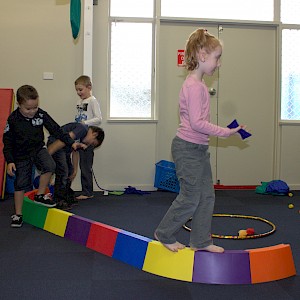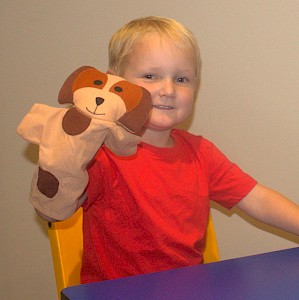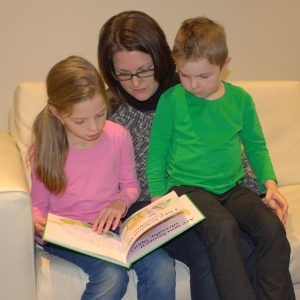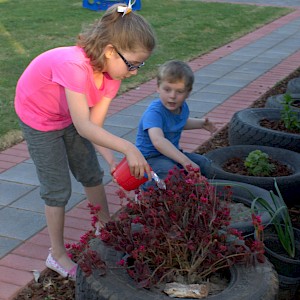At Talking Matters we believe learning to communicate should be enjoyable for children and their families. In the next two blogs we’ve included lots of ideas on how these activities can be used to develop children’s skills while they think they are just having fun. The activities can be adapted and changed according to your child’s age and skill level and we have included ideas for toddlers, preschoolers and school age children.
Holiday activity "Bubbles"
Kids and speech pathologists love bubbles it is a great outside activity. You can buy bubble mixture cheaply from supermarkets or make your own.
One recipe to try is:
1/2 cup dish washing detergent
1 cup water
2 teaspoons sugar
Mix together and store in a container
For young children you can use bubbles to develop: eye contact, (hold the bubble wand ready, call their name, wait until they look at you then blow) requesting (wait for a sound, gesture or word that shows they want more) and to model, repeat and encourage imitation of simple words (more, up, pop, bubble all use lip sounds /m/, /p/, /b/ which are easy to see and copy).
For older children try different things from the kitchen to make different types of bubbles. Use a baking tray and try a wire coat hanger bent to make a giant bubble wand for giant bubbles. You will need to swing it through the air rather than blowing. Practice counting and size concepts. Use a timer to record how long bubbles to take to pop and see who can blow a record bubble to develop concepts of time.
Try bubble prints to develop concepts of shape and colour. Put some bubble mixture in a cup with some food colouring. Blow with a straw until bubbles come over the top of the cup then lay a piece of paper over the bubbles to make a print.
School Holiday Activity "Obstacle course"
On a lovely day why not get outside and make an obstacle course. If you have a lawn or paved area you can set out some things such as tables or chairs covered with a blanket to go under or through, things to balance on such as a plank, sleeper or row of bricks, things to jump over such as a rope or hose laid out on the ground. You could have a washing basket to throw a ball into, or some plastic bottles with a little water in the bottom to make skittles to knock down.
Using all these items plan out a path. For younger children walk around the path with them at first and talk about position concepts “in, on, under, through, around”. Older children could make a series of signs, either with numbers or for older kids instructions about where to go next and stick them on the obstacles to practice numbers, sequencing and literacy skills. You could also call out a series of instructions for your child to follow to practice listening and memory skills. Start simple and gradually make the instructions more complex. Include position concepts and descriptive words such as ”go” quickly through the tunnel and slowly under the chair”.
If you do not have the space or are going out for the day, a playground is a ready made obstacle course. Just bring a paper and pen for planning out your instructions. If you have a digital camera you could take a photo of your child at each obstacle and make a set of cards, power point display or a picture book to practice verbs, position words and describing words later on. Kids love learning materials they have helped to make and where they can see themselves.
School Holiday Activity "Cooking"
Kids love to cook and the holidays is a great time to slow down and let the kids be involved in making meals, or making their own snacks to keep them happy through the day. Kids will enjoy making simple things such as cheese on toast, cutting up a salad or fruit salad or threading fruit pieces on a skewer for a healthy snack. Try making a face on a mini muffin pizza or chopping some veggies to add to noodles and cheese. Cooking is a good way to get fussy eaters to try new foods. If you want to be more adventurous try some kids cookbooks from the library or search the net for some kid friendly recipes.
Make sure you take the chance to learn while you cook. Young children can learn the names of foods, but also describing words as you talk about the colour, shape, feel, smell and taste of foods as you cook. For example cutting a cucumber you can talk about the colour on the inside and the outside and cut it into long and short pieces as well as different shapes. Cooking is great for teaching action words as you chop, peel, slice, stir, wash and more.
Kids can use cooking to understand and develop procedures. Procedures relate to science based subjects and are about being able to describe, in order, the steps to a goal. Older kids can take photos of the food at each stage as they cook and at the end print and cut out the pictures and put them in order, then write out the sequence as a recipe. They could make their own recipe book with photos of the finished product and perhaps reviews by the adults acting as Masterchef judges. Younger kids will enjoy pictures of themselves at each stage and can also use these as a sequencing and describing activity.
School Holiday Activity "Puppets"
Kids love puppets and they can be a fun way to develop language skills and pretend play. You can make your own puppets very cheaply with items from around the house. Make them as simple or as complex as you like, depending on your time and your child’s concentration span. Make them represent characters that interest your child such as their favourite animal, story or movie characters or even a favourite football player. As you make the puppet young children can learn the names of body parts while older children can talk about facial expressions or make a procedure, using step by step photos as they make their puppet.
 With very young children a simple puppet can appear, disappear and reappear from behind a box, cushion or even your back and practice words such as “boo” or greetings “hi” and “bye”. Older children can help you make a puppet or two and act out a favourite story, song or rhyme or even make up their own story. Why not get a box from the supermarket and make a puppet theatre. You can video or take photos of the story as your children act it out and make a book or movie to keep.
With very young children a simple puppet can appear, disappear and reappear from behind a box, cushion or even your back and practice words such as “boo” or greetings “hi” and “bye”. Older children can help you make a puppet or two and act out a favourite story, song or rhyme or even make up their own story. Why not get a box from the supermarket and make a puppet theatre. You can video or take photos of the story as your children act it out and make a book or movie to keep.
Here are some cool websites with fun but inexpensive ideas for making puppets with kids.
http://familycrafts.about.com/od/puppets/tp/Puppet-Crafts-For-Kids.htm
http://www.play-script-and-song.com/easy-to-make-puppets.html
School Holiday Activity "Treasure Hunt"
This fun and free activity can develop your child’s vocabulary and can be done anywhere; indoors, outdoors, on outings, even shopping. Just make a list of things that you want your children to find and have a small prize to reward them at the end. Younger children might only have 3 things on their list, while older kids might have 10 or more. Younger children can have pictures on their list. Older kids can write down their lists themselves to practice writing and spelling skills. You can make your list and then hide things or you can use things that you know they will be able to find in a certain spot. You can either collect your things as you go or just tick them off as you find them. For a shopping treasure hunt you can cut 10 things out of a catalogue and paste them on paper then have your children tick them off as they see them in the shop.
Going for a walk treasure hunt list might be to find: a feather, smooth stone, green leaf, brown leaf, piece of bark, gum nut and a seed pod. A driving in the car treasure hunt list might be a red car, a bus, a semi trailer, a bakery, a bird, a stop sign and a traffic light. You can use treasure hunts to practice developing concepts, such as find 3 red things, 3 big things and 3 smooth things. Include colours, size, shapes and textures. You can also practice literacy skills; find three things that start with “b”, three things that end with “t” and something that rhymes with “cat”. Think about beginning sounds, ending sounds, rhyming and numbers of syllables or letters depending on your child’s skills. You can also practice categories; find 3 fruits, 3 vegetables and 3 pieces of clothing, or functions; find something for eating, something for cleaning and something for wearing.
School Holiday Activity "Books"
Keep your kids busy and learning with books. Sharing a book with a child is a calming and bonding way to help your child learn. Babies love books they can touch and explore such as flap books or ones with bright colours, familiar pictures or textures to explore. Toddlers love simple action stories with repeated lines or rhyme. Preschoolers begin to love books with real “stories”.
Stories have a predictable structure; with a beginning, middle section where a problem usually occurs and ending where it all works out. Understanding this structure helps children read, comprehend and write. Kids learn this structure by hearing lots of different stories.
Mem Fox in her book “Reading Magic” suggests reading three stories each day, a new one, a familiar one and a favourite that has been heard many times.
You can also help your child’s language development by discussing the story and pictures as you go. Young children can answer “what” and “where” questions while older children are challenged by more complex questions such as “Why do you think..?”, “How can you tell….?” or “What will happen next?”
Children can’t usually read at their level of understanding until around 10 years of age so keep reading to your children even after they begin to read themselves. Good quality children’s novels can be a great way to share time with older children. If you’re not sure what is good for your child’s level ask your local librarian to recommend some books your child may like.
For reluctant readers try making your own books, by hand or on the computer, using a digital camera, Google images or clip art to illustrate. Some children enjoy non fiction books about topics they are interested in. Libraries and bookshops often have school holiday activities which are free or inexpensive to help kids get into reading. Borrowing a library book is free so why not visit your library today or even make it a regular part of your family routine. Second hand bookshops and op shops are an inexpensive way to collect books to keep.
Check your local library website for school holiday programs in your area to see what is happening for kids near you.
School Holiday Activity "Gardening"
If at you’re home in the holidays and it is a lovely sunny day, why not get outside in your back yard and do some gardening with your kids. Kids love to grow things. They love to have their own “patch”. Even just a large pot will do. Seeds are cheap to buy and easy for kids to plant but choose things that grow quickly so that they do not have to wait long to see something happening.
Nasturtiums are very quick and easy to grow, have big bright flowers and you can eat both the leaves and flowers in salad which looks spectacular. Spring is the time to plant sunflower seeds which grow quite quickly into giant plants around 2 metres tall with enormous flowers. Hollyhocks are also colourful giant plants that are quick and easy to grow from seed. Plant a row of these if you have the space and measure them as they grow to develop your child’s understanding of number concepts.
Growing things to eat is fun for kids and helps them try healthy foods they may not have tried or enjoyed before. Zucchini, pumpkin, cucumbers and beans are quick and easy to grow from seeds. You can also get some seedlings from your nursery for a few dollars. For a really quick and tasty result try cherry tomatoes, lettuce, parsley or basil.
This website has lots and lots of great kids garden ideas, set out in step by step kid friendly procedures. http://www.global-garden.com.au/gardenkids.htm
You could work though a procedure developing reading, listening, vocabulary and comprehension skills. If you take some photos as you work through the steps and as your plants grow, you can make your own procedure which will develop over then next few weeks or months to develop literacy skills as well. If you plant a number of things over time your could make a garden journal and include photos, drawings and even some pressed flowers or leaves. Don’t forget, if you grow food, include the cooking and eating steps too.
If you want to get out and about the Adelaide Botanic Gardens has kids holiday activities .
http://www.environment.sa.gov.au/botanicgardens
Stephanie Alexander is a well known chef who combines gardening , cooking and kids. Check out her website for some inspiration at http://www.kitchengardenfoundation.org.au/
Look for our next blog which will also include some more holiday activities for children.
If you are concerned about your child’s development check our website https://www.talkingmatters.com.au/ to see how speech pathology and occupational therapy may help if you are still concerned. If you suspect that your child is having difficulty with their development, it is recommended to consult a speech pathologist or an occupational therapist to discuss your concerns further.
Related Blog Posts
If you liked this post you may also like:
Tooth brushing
Learning to manage emotions
Our 9 senses, yes 9!
Why books for christmas



